![]() 9 - 11 September 2009
9 - 11 September 2009
Malta
Overview
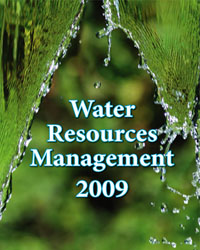
The fifth International Conference on Water Resources Management took place recently in Malta organised by the Wessex Institute of Technology. The Conference Chairmen and co-editors of the book were Professor Carlos A. Brebbia, Director of WIT and Professor Viktor Popov, Head of the Environmental Fluid Mechanics Division of the Institute.
The first Water Resources Management meeting took place in Halkadiki, Greece, in 2001; followed by Las Palmas, Gran Canaria (2003); The Algarve, Portugal (2005) and Kos in Greece in 2007.
The meeting attracted papers dealing with the more recent developments in water resources management, a topic of growing concern as those resources are under extra pressure all over the world. Water has become a precious resource and the issues of water quality, quantity, management and flooding, as well as other related topics presented at the conference in that both are essential for our common future.
The choice of Malta as the location for the conference helped to emphasise the pioneering work carried out in the island in the field of water conservation, re-use, de-salinisation and sustainable exploitation of scarce subsurface resources. Malta, in spite of its water scarcity, has developed a very successful tourism industry.
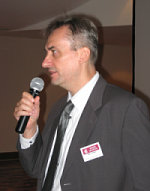 Carlos Brebbia opened the conference by emphasising the importance of the series of meetings organised by WIT in terms of the quality of the exchange of knowledge across many different disciplines and all over the world. This conference – Carlos said – is the conference is one of the most important meetings organised by his Institute, one that has brought together colleagues from difference specialities in an effort to facilitate dissemination of knowledge in a manner that technological advances can be applied for the solution of society’s problems.
Carlos Brebbia opened the conference by emphasising the importance of the series of meetings organised by WIT in terms of the quality of the exchange of knowledge across many different disciplines and all over the world. This conference – Carlos said – is the conference is one of the most important meetings organised by his Institute, one that has brought together colleagues from difference specialities in an effort to facilitate dissemination of knowledge in a manner that technological advances can be applied for the solution of society’s problems.
Professor Viktor Popov also welcomed the delegates hoping that they will find the meeting profitable in terms of making new contacts and finding ways leading to further collaboration.
Conference Topics
The contributions presented at the conference and published in the book were divided into the following sections:
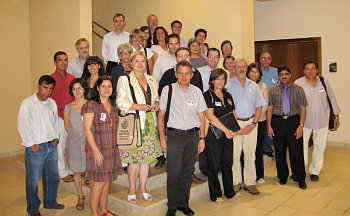 Water Management and Planning
Water Management and Planning- Waste Water Treatment and Reuse
- Water Quality
- Pollution Control
- Management and Economics
- Decision Support Systems
- Hydraulic Systems
- Flood Risk
- Hydraulic Modelling
- Irrigation Problems
- Governance and Monitoring
Invited Presentations
There were a series of invited presentations which helped to enhance the meeting:
- “Development and restoration of the urban rivers: examples from old downtown Tokyo, Japan” by M Takezawa, Nihon University, Japan
- “Optimized exploitation of aquifers: application to the Querença-Silves aquifer system” by M Cunha, University of Coimbra, Portugal
- “Water quality and emission rates of greenhouse gases in a treatment reedbed” by K Soosaar, University of Tartu, Estonia
- “Rational water use in the US: the potential for the retrofit of simple residential technologies” by S Mecca, Providence College, USA
- “Community and socio-economic impact of corporate purchase of water: lessons from Australia” by H Bjornlund, University of South Australia and University of Lethbridge, Canada
- “Study of the Prespa-Ohrid Lake system using tracer experiments and the lake’s water balance” by V Popov, Wessex Institute of Technology, UK
- “Four explicit formulae for friction factor calculations in pipe flow” by V Diniz, University of Campinas, Brazil
- “Affordability of household water and wastewater charges in Manukau City: a case study” by B Mahmood, Unitec, New Zealand
Hromadka Prize
The conference first morning session closed with the award of the Hromadka prize for outstanding presentation at this conference. Carlos explained that there were many nominations for the award and it was extremely difficult to decide who was to win. The committee guidelines were to look for originality and impact of the work in practice as well as being technologically sound. The award was instituted by Dr Ted Hromadka, a member of WIT’s Board of Directors in memory of his father. Ted is an outstanding professional engineer as well as researcher recognised by the international community in the field of hydraulic modelling and the Boundary Element Method.
The high standing of some of the delegates who didn’t receive the award was recognised by giving a diploma to distinguished participants in the competition. The following received the diploma;
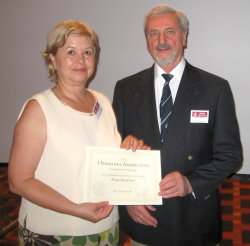 “Mathematical models for irrigation and nutrient management practices to improve nitrate pollution control” by Anca Marinov, Politechnic University of Bucharest
“Mathematical models for irrigation and nutrient management practices to improve nitrate pollution control” by Anca Marinov, Politechnic University of Bucharest
It proposes measures to reduce the nitrate pollution in groundwater by optimizing fertilizer’s application using a computer programme that can simulate different scenarios.
“Water resources management in the bottle water business” by Ronan Le Fanic, Nestle Water Management and Technology, France
The paper discusses water resources management and strategies to ensure sustainable water supply for the industry, emphasising the need to protect those resources in terms of quality and quantity.
“A hydro-economics model for managing groundwater resources in semi—arid regions” by Hamad Assaf, American University of Beirut, Lebanon
The paper presents an interactive decision support model based on economic principles and standard aquifer representation. The model is to help water policy makers and managers to assess water allocation policies.
“Four explicit formulae for friction factors calculation in pipe flow” by Victor Diniz, UNICAMP, Sao Paolo University, Brazil
The paper presents intensely practical results. The author gives four explicit formulae to calculate the friction factor for all flow regimes.
“A decision support system to assist river basin hydroelectric inventory in Brazil” by F.S. Costa of CEPEL, Electric Power Research Centre at Rio de Janiero State University, Brazil
The computerized decision support system analysed parameters to select the best solution for water distribution taking into consideration energy, economic, social and environmental balance.
“Landbased disposal of wastewater: Fate of Phosphorous” By Iris Vogela, Hort Research, New Zealand, presently at Dresden University, Germany
The work describes a series of laboratory experiments to remove Phosphorous nutrients from wastewater. The results set important guidelines regarding times required for removal of the contaminants by infiltration tests.
“Increasing pollution and harmful benthic Cyanobacterial blooms in Fethiye Bay, Turkey” by Emine Okudan, Akdeniz University, Turkey
This paper analyses a problem that affects many regions of the world, i.e. that of harmful algal blooms, attributed to nutrient enrichment associated with coastal eutrophication. This paper documents the formation patterns around Fathiye Bay
This year a special Hromadka prize has been awarded to Professor Stephen Mecca from Providence College in the USA for his life long achievements in the field of hydraulic engineering and environmental research. He has not only carried out important research in these areas but also generously contributed to improve teaching and research in other institutions around the world. He has been a participant in many Wessex Institute of Technology meetings where his contributions demonstrated his concern with solving practical problems, particularly those related to improving the environment.
He has two important presentations in this conference and the associated one on River Basin Management. They were;
“A natural laboratory for small estuary studies: the reincarnation of Town Pond”
This provided an opportunity to observe the early evolution of a new estuarine ecosystem, which can be used as a natural laboratory for short and long term studies of small estuaries.
“Rational water use in the US: the potential for the retrofit of simple residential technologies”
This paper relates to the development and application of a rational use scenario in which present consumption is examined against water conservation opportunities. It would make economic sense to users. Results indicate considerable savings could be achieved.
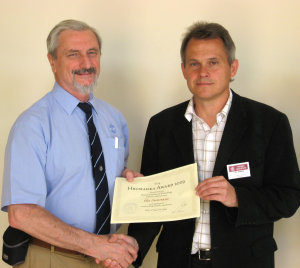 The Hromadka award for Water Resources Management was give to Ulo Suursaar for the following paper;
The Hromadka award for Water Resources Management was give to Ulo Suursaar for the following paper;
“Possible effect of reopening of the Vaike Strait (Baltic Sea): Results of high resolution modelling” by U Suursaar, University of Tartu, Estonia
This is an important contribution to the study of the ecological impact of a long established causeway separating the Gulf of Riga and the Väinameri Sea. The idea was to decide if the deterioration in the environment was due to the presence of the causeway, and if so if it is appropriate to allow flow between the two water bodies by building a series of bridges and openings along the causeway.
The study showed that such changes would have minimum effects. It was also concluded that even complete openings along the 3km causeway will not significantly affect the ecology of the region, whose deterioration is thought to be due to natural causes.
Social Activities
There were ample opportunities for interaction amongst the participants during the conference, the lunches that were offered by the organisers and other functions. The conference dinner in particular was a friendly event for the delegates to get to know each other better.
The conference banquet took place on the island of Gozo, renowned for its beautiful architecture and natural sites. The delegates were taken on a guided tour by an excellent guide who was able to explain the history of the island and to show its main sites, including the citadel in the capital, the well built fortifications and the legends surrounding the enchanted island. Afterwards, the delegates had dinner in a well known restaurant located at the top of a hill from which the whole of the island can be seen. The good standards of the food and the excellent wines helped to make this a unique occasion.
International Scientific Advisory Committee Meeting
The International Scientific Advisory Committee met over dinner to discuss how the conference has developed and propose new topics and objectives for the meeting. Other colleagues were invited to join the Board and the location of the 2011 conference was discussed. The ISAC felt the importance of the programme giving more weight to the demands of society for both more equitable water policies at international as well as national and regional scales. Another important consideration is the location of the next conference as it is felt that it is important to draw representatives from other nations as well as those countries already well-represented at the conference.Publication of Papers
 The proceedings of Water Resources Management V, 624pp (Print ISBN: 1-84564-199-3; On-line ISBN: 1-84564-376-8; Print ISSN: 1746-448X) are available from WIT Press priced at £237/US$427/€308. Orders can be placed by telephone: +44 (0) 238 029 3223, fax: +44 (0) 238 029 2853, e-mail:
The proceedings of Water Resources Management V, 624pp (Print ISBN: 1-84564-199-3; On-line ISBN: 1-84564-376-8; Print ISSN: 1746-448X) are available from WIT Press priced at £237/US$427/€308. Orders can be placed by telephone: +44 (0) 238 029 3223, fax: +44 (0) 238 029 2853, e-mail:
Papers from the conference will also be hosted online at the WIT eLibrary as volume 125 of WIT Transactions on Ecology and the Environment (On-line ISSN: 1743-1743-3541). For more details visit the WIT eLibrary at www.witpress.com


 Wessex Institute
Wessex Institute